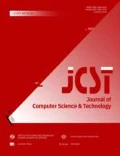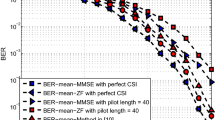Abstract
In this article, two methods adopting simplified minimum mean square error (MMSE) filter with soft parallel interference cancellation (SPIC) are discussed for turbo receivers in bit interleaved coded modulation (BICM) multiple-input multiple-output (MIMO) systems. The proposed methods are utilized in the non-first iterative process of turbo receiver to suppress residual interference and noise. By modeling the components of residual interference after SPIC plus the noise as uncorrelated Gaussian random variables, the matrix inverse for weighting vector of conventional MMSE becomes unnecessary. Thus the complexity can be greatly reduced with only slight performance deterioration. By introducing optimal ordering to SPIC, performance gap between simplified MMSE and conventional MMSE further narrows. Monte Carlo simulation results confirm that the proposed algorithms can achieve almost the same performance as the conventional MMSE SPIC in various MIMO configurations, but with much lower computational complexity.
Similar content being viewed by others
References
Tian L, Li J, Huang Y, Shi J, Zhou J (2012) Seamless dual-link handover scheme in broadband wireless communication systems for high-speed rail. IEEE Journal on Selected Areas in Communications 30(4):708–718
Qian M, Hardjawana W, Li Y, Vucetic B, Shi J, Yang X. Intercell interference coordination through adaptive soft frequency reuse in LTE networks. In Proc. IEEE Wireless Communications and Networking Conference, April 2012, pp.1618–1623.
Zhou Y, Ng TSN, Wang J, Higuchi K, Sawahashi M (2008) OFCDM: A promising broadband wireless access technique. IEEE Communications Magazine 46(3):38–49
Zhou Y, Wang J, Sawahashi M (2005) Downlink transmission of broadband OFCDM systems — Part I: Hybrid detection. IEEE Trans Communications 53(4):718–729
Caire G, Taricco G, Biglieri E (1998) Bit-interleaved coded modulation. IEEE Trans Information Theory 44(3):927–946
Zehavi E (1992) 8-PSK trellis codes for a Rayleigh channel. IEEE Trans Communications 40(5):873–884
Li X, Ritcey J A. Bit-interleaved coded modulation with iterative decoding. In Proc. IEEE Int. Conference on Communicaitons, June 1999, Vol.2, pp.858–863.
Haykin S, Sellathurai M, de Jong Y et al (2004) Turbo-MIMO for wireless communications. IEEE Communications Magazine 42(10):48–53
Lin W, He C. A low complexity iterative receiver for coded MIMO-OFDM systems. In Proc. IEEE Int. Conference on Acoustics, Speech, and Signal Processing, April 2007, Vol.3, pp.441–444.
Lee H, Lee B, Lee I (2006) Iterative detection and decoding with an improved V-BLAST for MIMO-OFDM systems. IEEE Journal on Selected Areas in Communications 24(3):504–513
Namboodiri V, Liu H, Spasojeviμc P. Low complexity turbo equalization for mobile MIMO OFDM systems. In Proc. IEEE Int. Conference on Communications and Signal Processing, Feb. 2011, pp.255–260.
Berrou C, Glavieux A (1996) Near optimum error-correcting coding and decoding: Turbo codes. IEEE Trans Communications 44(10):1261–1271
Viterbo E, Boutros J (1999) A universal lattice code decoder for fading channels. IEEE Trans Information Theory 45(5):1639–1642
Damen MO, Chkeif A, Belfiore JC (2000) Lattice codes decoder for space-time codes. IEEE Communications Lett 4(5):161–163
Hochwald BM, Ten BS (2003) Achieving near-capacity on a multiple-antenna channel. IEEE Trans Communications 51(3):389–399
de Jong Y, Willink T J. Iterative tree search detection for MIMO wireless systems. In Proc. the 56th Vehicular Technology Conference, September 2002, pp.1041–1045.
Lu B, Wang X, Narayanan KR (2002) LDPC-based space-time coded OFDM systems over correlated fading channels: Performance analysis and receiver design. IEEE Trans Communications 50(1):74–88
Dong B, Wang X, Doucet A (2003) A new class of soft MIMO demodulation algorithms. IEEE Trans Signal Processing 51(11):2752–2763
Gong G, Xia P. Iterative channel estimation and turbo equalization using ICI cancellation for MIMO-OFDM systems. In Proc. the 7th Int. Conference on Wireless Communications, Networking and Mobile Computing, September 2011, pp.1–4.
Purkovic A, Yan M. Turbo equalization in an LTE uplink MIMO receiver. In Proc. Military Communications Conference, November 2011, pp.489–494.
Wolniansky P W, Foschini G J, Golden G D, Valenzuela R A. V-BLAST: An architecture for realizing very high data rates over the rich-scattering wireless channel. In Proc. URSI Int. Symposium on Signals, Systems, and Electronics, Sept. 29-Oct. 2, 1998, pp.295–300.
Wang X, Poor HV (1999) Iterative (turbo) soft interference cancellation and decoding for coded CDMA. IEEE Trans Communications 47(7):1046–1061
Li Y, Xia X (2006) Iterative demodulation/decoding methods based on Gaussian approximation for lattice based space-time coded systems. IEEE Trans Wireless Communications 5(8):1976–1983
Shen F. Signal Statistical Analysis and Processing. Hefei, China: University of Science and Technology of China Press, 2001, pp.358-365. (In Chinese)
Tüchler M, Koetter R, Singer AC (2002) Turbo equalization: Principles and new results. IEEE Trans Communications 50(5):754–767
Author information
Authors and Affiliations
Corresponding author
Additional information
This work was supported by the Major Project of the Beijing Natural Science Foundation under Grant No. 4110001 and the National Science and Technology Major Project of China under Grant No. 2012ZX03001021-003.
The preliminary version of the paper was published in the proceedings of CHINACOM 2012.
Electronic Supplementary Material
Below is the link to the electronic supplementary material.
Rights and permissions
About this article
Cite this article
Han, J., Tang, C., Wang, QJ. et al. Simplified MMSE Detectors for Turbo Receiver in BICM MIMO Systems. J. Comput. Sci. Technol. 28, 445–453 (2013). https://doi.org/10.1007/s11390-013-1346-0
Received:
Revised:
Published:
Issue Date:
DOI: https://doi.org/10.1007/s11390-013-1346-0




